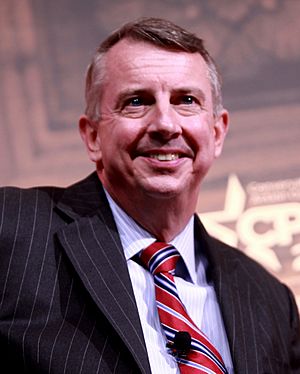Ed Gillespie facts for kids
Quick facts for kids
Ed Gillespie
|
|
|---|---|

Gillespie in 2014
|
|
| Counselor to the President | |
| In office July 5, 2007 – January 20, 2009 |
|
| President | George W. Bush |
| Preceded by | Dan Bartlett |
| Succeeded by | Pete Rouse (2011) |
| Chair of the Virginia Republican Party | |
| In office December 4, 2006 – June 13, 2007 |
|
| Preceded by | Kate Obenshain |
| Succeeded by | John Hager |
| Chair of the Republican National Committee | |
| In office July 25, 2003 – January 20, 2005 |
|
| Preceded by | Marc Racicot |
| Succeeded by | Ken Mehlman |
| Personal details | |
| Born |
Edward Walter Gillespie
August 1, 1961 Mount Holly, New Jersey, U.S. |
| Political party | Republican (1984–present) |
| Other political affiliations |
Democratic (before 1984) |
| Spouse | Cathy Gillespie |
| Children | 3 |
| Education | Catholic University (BA) |
Edward Walter Gillespie (born August 1, 1961) is an American politician, political strategist, and lobbyist. He has held several important roles in the Republican Party. He was the 61st Chair of the Republican National Committee from 2003 to 2005. He also served as Counselor to the President for President George W. Bush from 2007 to 2009.
Gillespie has also worked on many political campaigns. In 2012, he was a senior advisor for Mitt Romney's presidential campaign. He ran for office himself twice in Virginia. In 2014, he ran for the U.S. Senate and narrowly lost. In 2017, he was the Republican candidate for Governor of Virginia but was defeated in the election.
Outside of government, Gillespie co-founded a lobbying firm called Quinn Gillespie & Associates. A lobbyist is someone who tries to persuade government officials to support a certain cause or policy. In 2020, he was hired by AT&T as a senior executive.
Contents
Early Life and Education
Ed Gillespie was born in Mount Holly, New Jersey. He grew up in the Browns Mills area of Pemberton Township, New Jersey. His father was an immigrant from Ireland, and his parents owned a small grocery store where Gillespie worked after school.
He graduated from Pemberton Township High School and later attended The Catholic University of America in Washington, D.C.. While in college, he got a job as a parking lot attendant for the U.S. Senate. This job helped him start his career in politics.
Political Career
Starting in Politics
Gillespie grew up in a family that supported the Democratic Party. His first job in politics was as an intern for Andy Ireland, who was a Democratic congressman at the time. In 1984, Ireland switched to the Republican Party, and Gillespie did too. Gillespie said he agreed with President Ronald Reagan's ideas about government.
He later worked for the Republican National Committee (RNC) and was a top aide to House Majority Leader Dick Armey. He helped write the "Contract With America," a list of promises the Republican Party made in the 1994 elections.
In 2000, Gillespie was a senior communications advisor for George W. Bush's presidential campaign. He helped organize the party's convention and was a key spokesman for the campaign.
Lobbying Work
In 2000, Gillespie started a lobbying firm called Quinn Gillespie & Associates with his business partner Jack Quinn. The firm represented many large companies and became very successful. Lobbying firms work to influence government decisions on behalf of their clients.
Gillespie's work as a lobbyist sometimes created discussion. For example, his firm represented the energy company Enron. Some people felt his connections to powerful people in government could create a conflict of interest, which is when a person's private interests might interfere with their public duties. Gillespie has said he always followed the law and has been open about his clients.
Republican Party Leadership
In 2003, Gillespie became the Chairman of the RNC. The RNC is the main organization for the Republican Party. He led the party through the 2004 elections, where President Bush was re-elected.
After leaving the RNC, he helped guide two Supreme Court nominees, John Roberts and Samuel Alito, through their confirmation process. In 2006, he also served as the Chairman of the Republican Party of Virginia.
Counselor to the President
In 2007, President George W. Bush asked Gillespie to work in the White House as his counselor. His job was to give the president advice and help explain the president's policies to the public. One of his main tasks was to help build support for the "surge" in the Iraq War, which was a plan to send more U.S. soldiers to Iraq.
Campaigns for Public Office
2014 U.S. Senate Election
In 2014, Gillespie ran for the U.S. Senate in Virginia. He challenged the incumbent senator, Mark Warner. Polls showed Warner was far ahead, but the election was very close. Gillespie lost by less than one percent of the vote, which was a much smaller margin than anyone expected.
2017 Governor Election
After his close Senate race, many people expected Gillespie to run for Governor of Virginia in 2017. He won the Republican nomination after a tight primary race. He then faced the Democratic nominee, Ralph Northam, in the general election.
During the campaign, Gillespie focused on economic issues, like cutting taxes. He also ran ads about his opponent's positions on crime and immigration. The campaign received national attention. In the end, Gillespie lost the election to Northam, receiving 45% of the vote compared to Northam's 54%.
Political Positions
Gillespie's political views are generally seen as mainstream Republican. He has ties to both the establishment and grassroots parts of the party.
- Economy: He supports cutting income taxes to help the economy grow.
- Energy: He supports building more energy infrastructure, like pipelines, and is in favor of offshore drilling for oil and gas. He also supported the U.S. withdrawal from the Paris Agreement, an international agreement on climate change.
- Confederate Monuments: Gillespie believes that monuments honoring Confederate soldiers should not be removed. He has said they are a part of history and can be used to teach about the past.
- Healthcare: He opposed the Affordable Care Act (also known as Obamacare) and was against expanding Medicaid in Virginia.
- Immigration: He has spoken out against "sanctuary cities," which are places that limit their cooperation with federal immigration enforcement.
Personal Life
Gillespie is married to Cathy Gillespie. They met at a congressional softball game. Together, they have three children: one son and two daughters.
 | Jackie Robinson |
 | Jack Johnson |
 | Althea Gibson |
 | Arthur Ashe |
 | Muhammad Ali |


